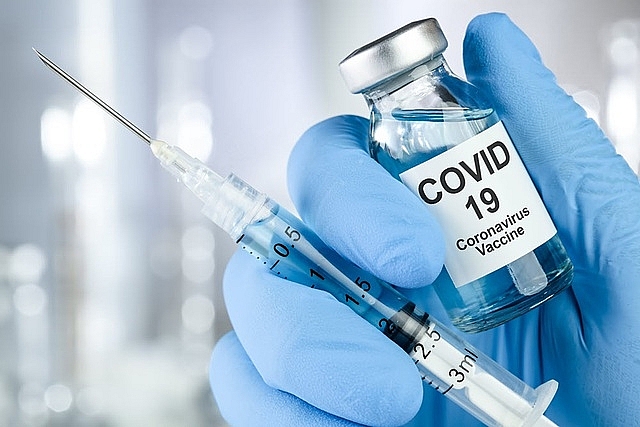"Made in Vietnam" COVID-19 vaccines nearing export ambitions
 |
| The development of Vietnamese-made COVID-19 vaccines is progressing well |
Four Vietnamese pharmaceuticals have been racing to produce COVID-19 vaccines since last year, with three already showing promising results in pre-clinical and clinical trials.
The vaccines are being researched by Company for Vaccine and Biological Production No.1 (Vabiotech), the Centre for Research and Production of Vaccines and Biologicals (Polyvac), the Institute of Vaccines and Medical Biologicals (IVAC), and Nanogen Pharmaceutical Biotechnology JSC (Nanogen).
Vabiotech, IVAC, and Nanogen have all shown promising results.
To date, Vietnam has developed two potential vaccines. Of these, Nano Covax by Nanogen has entered the second phase of human trials conducted at Vietnam Military Medical University and the medical centre of Ben Luc district on February 26. The trial focuses on evaluating antibody discovered in the first phase and searching for other antibodies against the new SARS-CoV-2 variants in the UK and South Africa. By May, the results will be sent to the National Ethics Committee in Biomedical Research of the Ministry of Health.
Meanwhile, Covivac by IVAC has officially entered into the first phase of human trials in March-October this year after successful pre-clinical studies on animals. Nguyen Ngo Quang, deputy director of the Ministry of Health’s Department of Science, Technology and Training, said that if the trial produces good results, the second phase will be implemented with a larger sample size.
Besides, the Covid-19 vaccine by Vabiotech is expected to begin human trials next month. According to chairman of Vabiotech Do Tuan Dat, this vaccine could be modified quickly to combat new coronavirus variants if successfully developed.
Expectations of bringing the "Made in Vietnam" vaccines to the international market are fully grounded as the nation is one of the 40 countries running COVID-19 vaccine trials as well as the 38 nations whose vaccine management agencies fulfil the World Health Organization's standards for a fully-equipped national regulatory system, creating opportunities to partner up with overseas partners especially in exporting vaccines.
According to the National Institute of Hygiene and Epidemiology, Vietnam does not aim to be a leader in vaccine production but will inherit the world's experiences in dealing with the new SARS-CoV-2 and focus on standard cold storage. Many existing vaccines, including Pfizer-BioNTech from Germany and Moderna from the US, need to be preserved and transported at temperatures between -80 and -20 degrees Celsius. This can affect delivery schedules due to the lack of specialised equipment. Meanwhile, Vietnamese vaccines can be stored at a normal refrigerator temperature of 2-8 degrees Celsius, according to Vietnam Military Medical University.
The Vietnamese vaccines could also help alleviate the supply-demand issues surrounding COVID-19 vaccines. According to the Economist Intelligence Unit, 84 of the world's poorest countries will not have enough COVID-19 vaccines to inoculate their populations until 2023.
Not even developed countries can guarantee that all of their populations will be fully vaccinated by the end of 2021, despite successfully producing vaccines, with Russia falling a year and a half behind its initial vaccination schedule, based on statistics released by Moscow.
Despite reports of side effects, foreign covid vaccines are proving effective and continue to be improved. According to ABC News published on March 25, 2021, researchers examined data from the employee health record system at the University of California, San Diego and University of California, Los Angeles showed that of the 36,659 workers in California vaccinated, 379 tested positive, mostly within two weeks after their first shot. 37 people tested positive almost less than a week after their second dose. Only seven health workers tested positive 15 days or more after their second vaccination.
Medical experts emphasise that vaccinated people may still be positive as the vaccine is not 100 per cent effective.
What the stars mean:
★ Poor ★ ★ Promising ★★★ Good ★★★★ Very good ★★★★★ Exceptional
Themes: Healthcare Platform
- Opella and Long Chau join forces to enhance digestive and bone health
- Hanoi intensifies airport monitoring amid Nipah disease risks
- Cosmetics rules set for overhaul under draft decree
- Policy obstacles being addressed in drug licensing and renewal
- Sanofi, Long Chau Pharmacy relaunch medicine blister pack collection initiative
Related Contents
Latest News
More News
- Vietnamese businesses diversify amid global trade shifts (February 03, 2026 | 17:18)
- Consumer finance sector posts sharp profit growth (February 03, 2026 | 13:05)
- Vietnam and US to launch sixth trade negotiation round (January 30, 2026 | 15:19)
- NAB Innovation Centre underscores Vietnam’s appeal for tech investment (January 30, 2026 | 11:16)
- Vietnam moves towards market-based fuel management with E10 rollout (January 30, 2026 | 11:10)
- Vietnam startup funding enters a period of capital reset (January 30, 2026 | 11:06)
- Vietnam strengthens public debt management with World Bank and IMF (January 30, 2026 | 11:00)
- PM inspects APEC 2027 project progress in An Giang province (January 29, 2026 | 09:00)
- Vietnam among the world’s top 15 trading nations (January 28, 2026 | 17:12)
- Vietnam accelerates preparations for arbitration centre linked to new financial hub (January 28, 2026 | 17:09)

 Tag:
Tag:


























 Mobile Version
Mobile Version